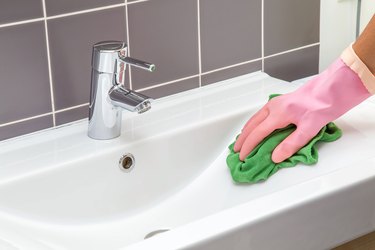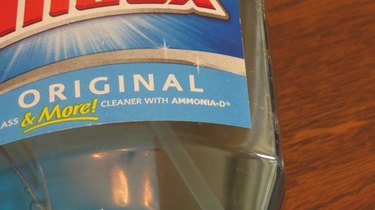
Ammonia is a versatile chemical found in many commercial cleaning products. Chemically, it is a compound that combines nitrogen and hydrogen, with a formula of NH3. While you can buy many products at a premium price that contain some amount of ammonia, ammonia as a stand-alone liquid is quite inexpensive, which makes it an economical product for cleaning your home in lieu of expensive and unnecessary commercial cleaners. Ammonia can replace a variety of cleaners found under your kitchen sink since a simple water-ammonia solution is renowned as a cleaner that cuts grease and leaves a streak-free shine.

Video of the Day
You should be aware, though, that although it is inexpensive, ammonia in concentrated form is caustic and hazardous, and thus needs to be treated with care when used for household cleaning. Thus, the appropriate solution of ammonia for cleaning is between 5 percent and 10 percent mixed with water. Avoid concentrations any higher than that.
Video of the Day
Glass Cleaner
Many commercial glass cleaners contain some percentage of ammonia for good reason. Ammonia will not only remove dirt and fingerprints from your glass, but it will leave your windows streak-free. Create your own glass cleaner by mixing 1 cup of clear ammonia with 3 cups of cool water. Wipe the glass clean with a lint-free cloth dampened in the mixture.
Tile Cleaner
Your bathroom and kitchen tiles will become dirty with everyday use. Ammonia will thoroughly clean the tiles while also killing any lingering fungus, such as mold or mildew. Fill a bucket with 1 gallon of water and 1/4 cup ammonia. Mix the contents together and carefully pour the mixture into a spray bottle for application. After scrubbing the tile, wipe it clean and dry with a lint-free cloth.
Soap Scum Remover
Over time, a build-up of soap scum will begin to form on your bathtub and in your sinks. Typically, this soap scum is pretty difficult to remove and will not budge under the efforts of normal cleaners. But you can dissolve the soap scum easily by scrubbing with a mixture of 1 gallon of hot water and 1 tbsp. of ammonia. After you have removed the soap scum, rinse the sink or tub clean with hot water.
Carpet and Upholstery Cleaner
Spills happen, and it is not uncommon for them to stain your carpet and upholstered furniture. Ammonia can help remove the toughest stains from your carpet and upholstery fibers. Dampen a cloth in a mixture of 1/2 gallon of warm water with 1 cup of clean, non-sudsy ammonia. Sponge the stain with the damp cloth for several seconds and let the mixture dry on the fibers.
Leather Cleaner
Scuff marks and dirt can spoil your leather goods, especially white shoes. Fortunately, with a little ammonia, you can remove the marks and discolorations and restore the look of your leather. Fill a small container with equal parts water and colorless ammonia. Dip the corner of a cloth in the solution and scrub the leather clean. Rinse with a fresh cloth moistened with clear water.
Crystal Cleaner
Dust, dirt, and other air impurities will land on the surface of your crystal and cause it to become dull. But ammonia will restore your crystal candlesticks, chandeliers, vases and figurines and keep them looking their best. Fill a small container with 2 cups of water and 3-4 drops of ammonia. Dip a lint-free cloth in the mixture and rub your crystal clean. Rinse the ammonia mixture off the crystal with cool running water, then dry with a towel.
Safety Considerations
The pungent, eye-watering smell of ammonia is enough to tell you that this is a chemical that should be handled with care. Here are some tips for handling ammonia safely:
Avoid breathing the vapors for long periods. Prolonged exposure can cause eye irritation and damage to lung tissues. Use protective gloves when cleaning with ammonia, and if possible, introduce ventilation into spaces you are cleaning.
- Be careful with concentrated forms of liquid ammonia. Always mix it with water when using it as a cleaning solution, and keep containers tightly lidded.
- If you have direct contact with undiluted ammonia, rinse eyes or skin with large quantities of fresh water.
- For ingestion of ammonia, dilution with milk or water is recommended. Ammonia is not considered highly poisonous.
- Never mix ammonia with bleach or products containing bleach. The resulting fumes are toxic and dangerous.
For further information on ammonia and other chemicals, contact:
- Centers for Disease Control and Prevention Public Response Hotline (1-888-246-2675)
- Agency for Toxic Substances and Disease Registry (1-888-422-8737)